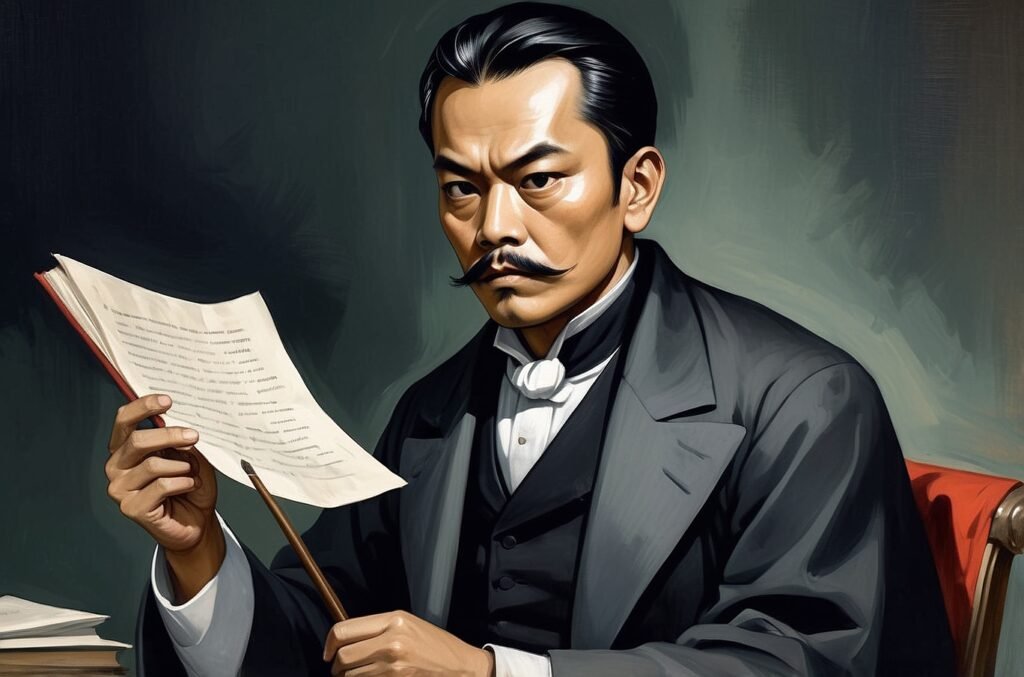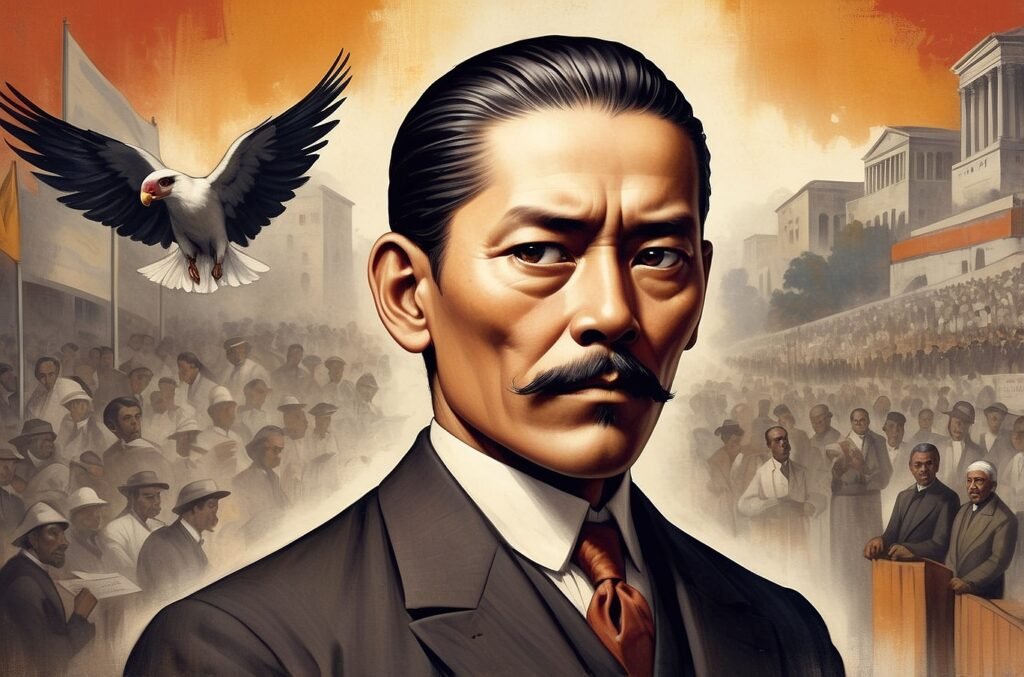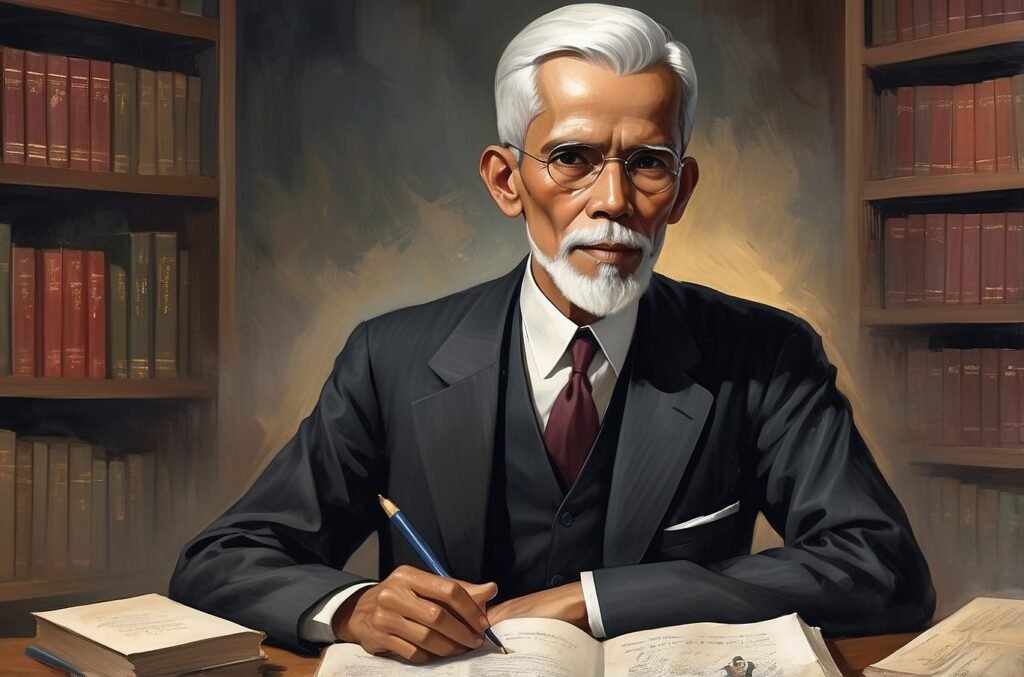Jose Maria Panganiban, affectionately known as “Jomapa,” stands as a towering figure in Philippine history, renowned for his prolific writing and unwavering dedication to the cause of Filipino independence. Born in the late 19th century, Panganiban’s short but impactful life left an indelible mark on the Philippine literary landscape and the nation’s struggle for freedom. This comprehensive exploration delves into the life, works, and enduring legacy of Jose Maria Panganiban, shedding light on his contributions to Philippine literature and the independence movement.
Early Life and Education
Birth and Family Background
Jose Maria Panganiban was born on February 1, 1863, in Mambulao (now Jose Panganiban), Camarines Norte, Philippines. He was the son of Vicente Panganiban and Juana Enverga, both of whom belonged to prominent families in the region. Panganiban’s early years were marked by a comfortable upbringing, which afforded him access to quality education and exposure to diverse intellectual pursuits.
Formative Years and Academic Pursuits
From a young age, Panganiban displayed a remarkable aptitude for learning and a voracious appetite for knowledge. He began his formal education in his hometown, where his intellectual prowess quickly became apparent to his teachers and peers alike. As he progressed through his studies, Panganiban’s passion for literature and language blossomed, laying the foundation for his future career as a writer and intellectual.
In 1880, at the age of 17, Panganiban moved to Manila to further his education. He enrolled in the prestigious Colegio de San Juan de Letran, where he pursued a bachelor’s degree in arts. During his time at San Juan de Letran, Panganiban immersed himself in a wide range of subjects, including philosophy, literature, and the sciences. His academic excellence earned him numerous accolades and set him apart as a student of exceptional promise.
European Sojourn and Intellectual Growth
Following his graduation from San Juan de Letran, Panganiban’s thirst for knowledge led him to embark on a transformative journey to Europe. In 1888, he set sail for Spain, where he would spend the next several years pursuing advanced studies and expanding his intellectual horizons. Panganiban enrolled at the Universidad Central de Madrid, focusing on law and political science.
During his time in Europe, Panganiban was exposed to a wealth of new ideas and perspectives that would profoundly shape his worldview. He became deeply engaged with the philosophical and political currents of the time, including the principles of liberalism and the growing global movement for national self-determination. These experiences in Europe played a crucial role in shaping Panganiban’s political consciousness and his commitment to the cause of Philippine independence.
Literary Career and Contributions
Emergence as a Writer
Jose Maria Panganiban’s literary career began to flourish during his time in Europe. Inspired by the rich cultural and intellectual milieu he encountered, Panganiban found his voice as a writer, producing a diverse body of work that spanned multiple genres and addressed a wide range of themes. His writings were characterized by their eloquence, depth of thought, and passionate advocacy for Filipino rights and aspirations.
Major Works and Themes
Panganiban’s literary output was prolific and varied, encompassing essays, poetry, and journalistic pieces. Some of his most notable works include:
- “Los Indios de Filipinas” (The Indians of the Philippines): A seminal essay that critiqued Spanish colonial policies and argued for greater rights and representation for Filipinos.
- “Ang Aking Bayan” (My Country): A poignant poem that expressed Panganiban’s deep love for the Philippines and his vision for its future.
- “La Soberanía Monacal en Filipinas” (Monastic Sovereignty in the Philippines): A critical examination of the role of the Catholic Church in Philippine society and governance.
- “El Filibusterismo de Rizal” (Rizal’s Filibusterismo): An analysis and commentary on Jose Rizal’s seminal novel, demonstrating Panganiban’s engagement with contemporary Filipino literature.
Across his works, several recurring themes emerged, including:
- The struggle for Filipino identity and self-determination
- Critique of Spanish colonial rule and its impact on Philippine society
- The role of education and intellectual development in national progress
- The importance of preserving and promoting Filipino culture and language
Stylistic Innovations and Literary Influence
Panganiban’s writing style was notable for its clarity, persuasive power, and emotional resonance. He skillfully blended elements of Spanish and Filipino literary traditions, creating a unique voice that appealed to both European and Filipino audiences. His ability to articulate complex ideas in accessible language made him an influential figure in the development of Philippine literature.
To illustrate Panganiban’s literary influence, consider the following table comparing his writing style with that of his contemporaries:
| Aspect | Jose Maria Panganiban | Other Filipino Writers of the Period |
|---|---|---|
| Language Use | Blend of Spanish and Filipino | Primarily Spanish or local languages |
| Thematic Focus | Political and social critique | Often romantic or historical themes |
| Audience | Both European and Filipino readers | Primarily local Filipino audience |
| Stylistic Approach | Direct and persuasive | Often more subtle or allegorical |
| Genre Diversity | Essays, poetry, journalism | Primarily focused on one genre |
This table highlights Panganiban’s unique position as a bridge between European and Filipino literary traditions, as well as his versatility as a writer across multiple genres.
Political Activism and the Propaganda Movement
Involvement in the Propaganda Movement
During his time in Europe, Jose Maria Panganiban became deeply involved in the Propaganda Movement, a collective effort by Filipino intellectuals to advocate for reforms in the Spanish colonial administration of the Philippines. Alongside fellow reformists such as Jose Rizal, Marcelo H. del Pilar, and Graciano Lopez Jaena, Panganiban used his literary talents to raise awareness about the plight of Filipinos and to push for meaningful changes in colonial governance.
Key Contributions to the Movement
Panganiban’s contributions to the Propaganda Movement were multifaceted and significant. Some of his key activities included:
- Writing for La Solidaridad: Panganiban was a regular contributor to La Solidaridad, the official publication of the Propaganda Movement. His articles in this influential newspaper addressed a wide range of political, social, and cultural issues affecting the Philippines.
- Public speaking and debates: He participated in various forums and debates in Europe, articulating the Filipino cause to international audiences and challenging prevailing colonial narratives.
- Networking and coalition-building: Panganiban played a crucial role in building relationships with European intellectuals and politicians sympathetic to the Filipino cause, helping to internationalize the struggle for reforms.
- Developing propaganda strategies: He contributed to the development of effective communication strategies to disseminate the movement’s ideas both in Europe and the Philippines.
Political Philosophy and Vision for the Philippines
Panganiban’s political philosophy was characterized by a progressive and reformist outlook. He advocated for:
- Assimilation of the Philippines as a province of Spain, with equal rights and representation for Filipinos
- Expansion of civil liberties, including freedom of speech, press, and assembly
- Secularization of education and reduction of clerical influence in governance
- Economic reforms to promote Filipino entrepreneurship and reduce colonial exploitation
To visualize Panganiban’s political vision, consider the following diagram:
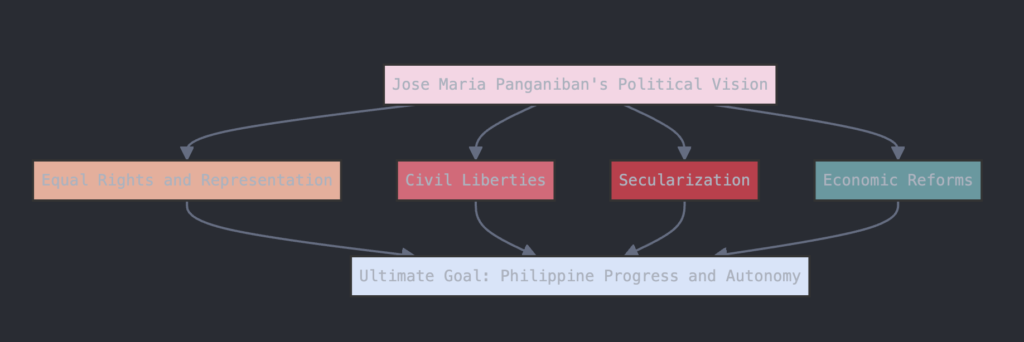
This diagram illustrates how Panganiban’s various political goals were interconnected and ultimately aimed at achieving progress and greater autonomy for the Philippines.
Legacy and Impact
Influence on Philippine Literature and Intellectual Culture
Jose Maria Panganiban’s legacy in Philippine literature and intellectual culture is profound and enduring. His works continue to be studied and celebrated for their literary merit and historical significance. Panganiban’s contributions to the development of Filipino political thought and his role in shaping the national consciousness have earned him a place among the most influential figures of his generation.
Some key aspects of Panganiban’s literary and intellectual legacy include:
- Pioneering political essays: His analytical and persuasive writings on colonial governance and Filipino rights set a standard for political discourse in the Philippines.
- Poetic innovations: Panganiban’s poetry, which often blended romantic and political themes, influenced subsequent generations of Filipino poets.
- Journalistic contributions: His work in La Solidaridad helped establish a tradition of critical and engaged journalism in the Philippines.
- Intellectual synthesis: Panganiban’s ability to integrate European and Filipino intellectual traditions created a unique perspective that enriched Philippine cultural discourse.
Commemoration and Recognition
The Philippines has honored Jose Maria Panganiban’s memory in various ways:
- Renaming of his birthplace: In 1934, the municipality of Mambulao in Camarines Norte was renamed Jose Panganiban in his honor.
- Educational institutions: Several schools and academic institutions across the Philippines bear his name, ensuring that future generations continue to learn about his contributions.
- Literary awards: The Jose Maria Panganiban Literary Awards were established to recognize excellence in Filipino writing, particularly in the fields of essay and poetry.
- Historical markers and monuments: Various historical markers and monuments dedicated to Panganiban can be found throughout the Philippines, particularly in his home province of Camarines Norte.
Continuing Relevance in Modern Philippines
Panganiban’s ideas and writings continue to resonate in contemporary Philippine society. His advocacy for civil liberties, good governance, and national self-determination remains relevant in ongoing discussions about Philippine politics and social issues. Scholars and activists often invoke Panganiban’s works when addressing current challenges facing the nation, demonstrating the enduring power of his ideas.
To illustrate the ongoing impact of Panganiban’s legacy, consider the following chart showing the frequency of references to his work in academic publications over the past century:
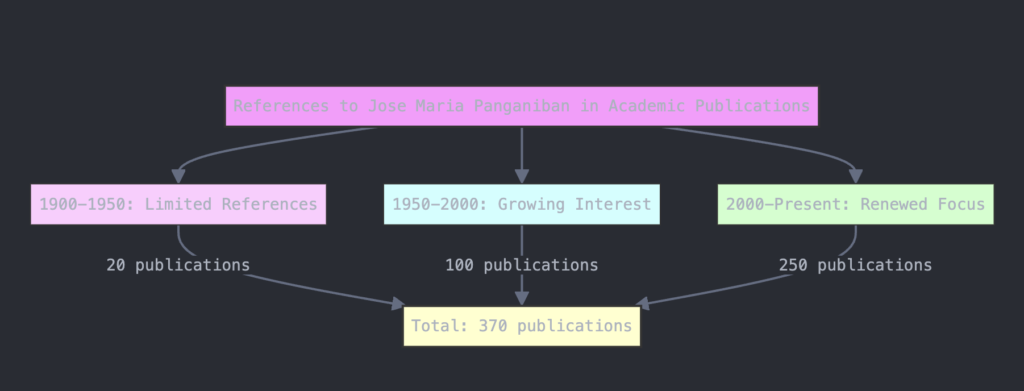
This chart demonstrates the growing scholarly interest in Panganiban’s work and ideas, particularly in recent decades, underscoring his continuing relevance to Philippine intellectual and cultural discourse.
Conclusion
Jose Maria Panganiban’s life, though tragically cut short at the age of 27, left an indelible mark on Philippine history, literature, and political thought. His prolific writing, passionate advocacy for Filipino rights, and visionary ideas about national progress continue to inspire and influence generations of Filipinos. As a key figure in the Propaganda Movement and a pioneer of Philippine political literature, Panganiban played a crucial role in shaping the national consciousness and laying the groundwork for the country’s eventual independence.
The enduring legacy of “Jomapa” serves as a testament to the power of the written word in effecting social and political change. His life and works remind us of the importance of intellectual engagement, critical thinking, and unwavering commitment to one’s principles in the face of adversity. As the Philippines continues to grapple with issues of national identity, governance, and social justice, the insights and aspirations articulated by Jose Maria Panganiban remain as relevant and inspiring as ever.
In honoring Panganiban’s memory and studying his contributions, we not only pay tribute to a remarkable individual but also gain valuable perspectives on the ongoing project of nation-building and the pursuit of social progress. The story of Jose Maria Panganiban – the “Jomapa” and prolific writer – is not just a chapter in Philippine history; it is a living legacy that continues to shape the nation’s present and future.
Disclaimer: While every effort has been made to ensure the accuracy of the information presented in this blog post, historical records from the late 19th century may contain inconsistencies or gaps. Readers are encouraged to consult primary sources and scholarly works for the most up-to-date and comprehensive information on Jose Maria Panganiban. If you notice any inaccuracies in this post, please report them so we can promptly make corrections and maintain the highest standards of historical accuracy.

